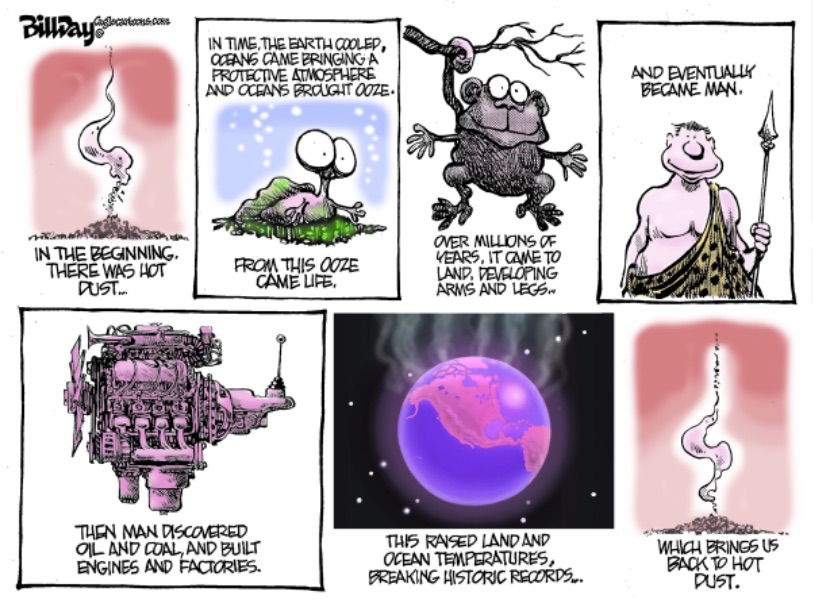Polluters Should Pay
It's Time to Charge for Carbon Pollution

Central Coast residents understand the magnitude of global climate change. We’ve seen drought conditions persist for years. We’ve witnessed more frequent and intense wildfires threatening our communities. We’ve experienced “atmospheric rivers” of rain resulting in deadly debris flows. More than most communities, Santa Barbara knows what oil pollution looks like and understands how emissions from burning fossil fuels are over-heating our planet.
Santa Barbara is far from alone in this experience. In 2023, communities nationwide saw their lives impacted by unparalleled weather and climate extremes such as wildfires and drifting toxic smoke, droughts, flooding, storms, and record precipitation. Scientists also confirmed last year was the hottest year on record.
The destruction and mounting costs from these events are tragic enough. What’s worse? It’s happening because of the ongoing actions of big polluters, many of which are countries the U.S. conducts trade with. They’re pumping Earth’s atmosphere full of carbon pollution, leading to a warmer world and more extreme weather.
As individuals, we sometimes have no choice but to drive a gas car to work or heat our homes with fossil fuels so our families are warm during winter. We can do our best to make climate-friendly choices, transitioning to clean energy and taking responsibility for reducing our individual carbon footprints. But the carbon footprints of the world’s biggest polluters dwarf our own, and they must be held accountable. In short: Polluters should pay.
It’s a simple idea — and most Americans already support it. A recent poll revealed that 76 percent of Americans think large polluters should pay for the destructive emissions that overheat the planet and tarnish our air. According to the 2023 Yale Climate Opinion Maps, 72 percent of people right here in Santa Barbara County support taxing fossil-fuel companies. The same idea should hold true for our trading partners on the international stage.
And of course, America should do everything possible to reduce our country’s own carbon pollution. We’re heading in the right direction — U.S. emissions declined 1.9 percent in 2023, according to the Rhodium Group, and our economy produces fewer emissions during manufacturing than similar industries overseas. Yet foreign polluters with lower environmental standards can undercut American manufacturers without penalty.
Increasingly, countries are moving to hold polluters accountable, often through trade. With 30 percent of global emissions presently generated by the production and transport of exported and imported goods, it’s a great place to start.
The E.U. and the U.K. have begun the process of imposing a carbon border adjustment mechanism (CBAM) to collect a fee at the border from high-polluting countries that undercut their domestic manufacturers with cheaper, carbon-heavy products.
This policy idea has bipartisan appeal in the U.S., too, since 75 percent of U.S. imports come from countries that produce more carbon pollution than the products we make here at home. In November 2023, Republican Senators Cassidy and Graham introduced the Foreign Pollution Fee Act. Just weeks later, Democrats in the House and Senate reintroduced the Clean Competition Act.
Both bills propose a fee on key materials such as aluminum, cement, iron and steel, and fossil fuels based on their carbon pollution. These policies would level the playing field by charging dirty importers for the difference between their high-emission products and our cleaner, domestic goods — and incentivize other countries to do better.
Both bills also include measures intended to exempt developing nations from some or all of the carbon price, to avoid damaging the economies of poorer countries that are not responsible for most of the world’s carbon pollution.
It’s clear with a little compromise, legislators can introduce bipartisan CBAM policy that appeals to both sides of the aisle. Santa Barbara’s Member of Congress, Representative Salud Carbajal, recently introduced legislation to do just that, The Energy Innovation Act (HR-5744). If enacted, this “polluter pays” legislation would reduce emissions 50 percent by 2030 and reach 100 percent reduction of net emissions by 2050.
When big polluters get a free pass to harm the planet, they cost our communities dearly. It’s time for them to pay a price.
Robert Taylor is a frequent opinion contributor to The Santa Barbara Independent and a member of the Santa Barbara Chapter of Citizens Climate Lobby. Mark Reynolds is Executive Director of Citizens Climate Lobby, a national nonprofit, nonpartisan grassroots organization of more than 200,000 volunteers, with chapters in every congressional district.
